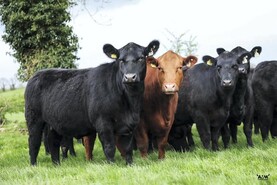The Dairy Beef Calf Programme, introduced as a pilot programme in 2021, will be expanded upon and included in Ireland’s CAP Strategic Plan 2023-2027 (CSP).
The document states that the SWOT analysis and needs assessment carried out as part of developing the plan for the next CAP identified the need to improve animal welfare in Ireland, including that of male dairy calves.
Improving the welfare of male dairy calves was also one of the European Commission’s recommendations for Ireland’s CSP.
Proposed structure
The proposed structure includes two measures: a young calf measure and a growing stage measure.
The young calf measure is available for breeding-only dairy herds, while the growing stage measure is applicable for all farmers who own and rear dairy beef calves.
Breeding dairy herds that rear calves can apply for both measures.
There are no proposed details on the level of payment
Each measure will offer participants the option to complete two actions from a list of category A options and a list of category B options. Applicants must choose a minimum of one action per category, but may pick two actions.
There are no proposed details on the level of payment or the total funds allocated from Pillar II to the intervention.
The document states that the total amount payable to eligible applicants will depend on the measures chosen by the applicants and the actions chosen within each measure.
The following is the proposed list of actions that farmers can select from:
Young calf category A: sexed semen or genotyping.Young calf category B: high DBI AI or beef stock bull.Growing stage category A: calf weighing of less than one-year-old cattle or weighing of dairy beef animals less than two years old.Growing stage category B: parasite control or forage quality.Training course
Participants will be required to engage annually in a two-hour training course either online or in person.
The reasoning for this requirement is “to ensure participants fully understand the outcome of the commitments they enter into within the scheme” and “to ensure that the technologies used and information provided to participants can be correctly interpreted”.
In addition, participants will be required to attend a half-day livestock handling training course before the end of year one.
Proposed eligibility and selection criteria
In order to be eligible an applicant must:
• Have submitted a Basic Income Support for Sustainability (BISS) application in a reference year and continue to submit BISS applications on which all their lands are declared for the duration of the Dairy Beef Welfare Scheme.
• Have beef breed animals born annually in the herd in each scheme year where the beneficiary is in the young calf measure.
• Be a member of the Bord Bia Sustainable Beef and Lamb Assurance/Sustainable Dairy Assurance Scheme as appropriate.
The Dairy Beef Calf Programme, introduced as a pilot programme in 2021, will be expanded upon and included in Ireland’s CAP Strategic Plan 2023-2027 (CSP).
The document states that the SWOT analysis and needs assessment carried out as part of developing the plan for the next CAP identified the need to improve animal welfare in Ireland, including that of male dairy calves.
Improving the welfare of male dairy calves was also one of the European Commission’s recommendations for Ireland’s CSP.
Proposed structure
The proposed structure includes two measures: a young calf measure and a growing stage measure.
The young calf measure is available for breeding-only dairy herds, while the growing stage measure is applicable for all farmers who own and rear dairy beef calves.
Breeding dairy herds that rear calves can apply for both measures.
There are no proposed details on the level of payment
Each measure will offer participants the option to complete two actions from a list of category A options and a list of category B options. Applicants must choose a minimum of one action per category, but may pick two actions.
There are no proposed details on the level of payment or the total funds allocated from Pillar II to the intervention.
The document states that the total amount payable to eligible applicants will depend on the measures chosen by the applicants and the actions chosen within each measure.
The following is the proposed list of actions that farmers can select from:
Young calf category A: sexed semen or genotyping.Young calf category B: high DBI AI or beef stock bull.Growing stage category A: calf weighing of less than one-year-old cattle or weighing of dairy beef animals less than two years old.Growing stage category B: parasite control or forage quality.Training course
Participants will be required to engage annually in a two-hour training course either online or in person.
The reasoning for this requirement is “to ensure participants fully understand the outcome of the commitments they enter into within the scheme” and “to ensure that the technologies used and information provided to participants can be correctly interpreted”.
In addition, participants will be required to attend a half-day livestock handling training course before the end of year one.
Proposed eligibility and selection criteria
In order to be eligible an applicant must:
• Have submitted a Basic Income Support for Sustainability (BISS) application in a reference year and continue to submit BISS applications on which all their lands are declared for the duration of the Dairy Beef Welfare Scheme.
• Have beef breed animals born annually in the herd in each scheme year where the beneficiary is in the young calf measure.
• Be a member of the Bord Bia Sustainable Beef and Lamb Assurance/Sustainable Dairy Assurance Scheme as appropriate.






 This is a subscriber-only article
This is a subscriber-only article










SHARING OPTIONS: